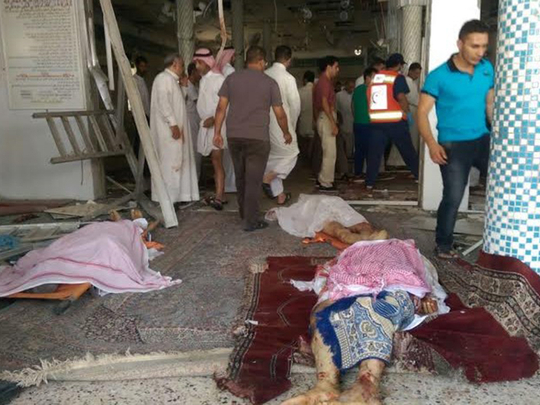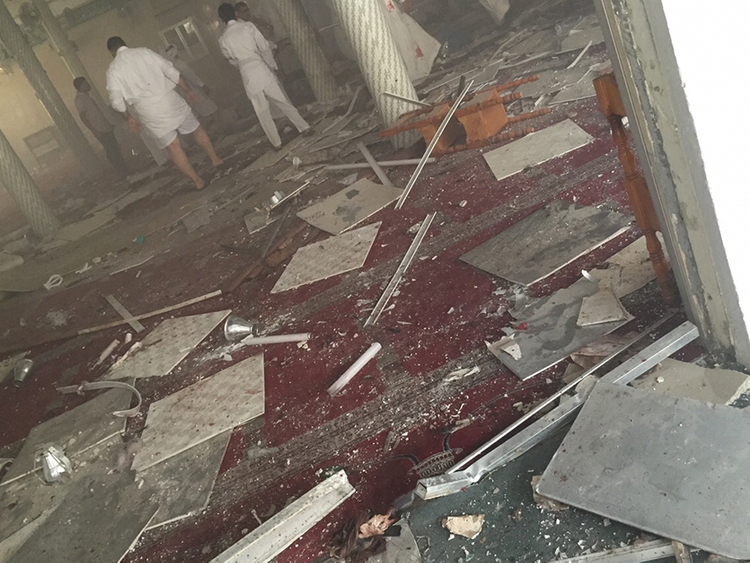
Riyadh: A suicide bomber targeted a mosque in eastern Saudi Arabia as worshippers were commemorating the 7th century birth of a revered figure on Friday, the Interior Ministry and residents said.
Habib Mahmoud, managing editor for the state-linked Al-Sharq newspaper in Qatif, said that the local Red Crescent authorities confirmed to him that 19 people had been killed and 28 wounded.
There was no immediate word from the Interior Ministry on casualties. The area is heavily populated by members of Saudi Arabia's Shiite minority.
Saudi Arabia's Interior Ministry initially reported that an explosion struck a mosque in the eastern province of Qatif after Friday prayers, without providing further details. It later confirmed that a suicide bomber who hid the explosives under his clothes was behind the attack.
It is the second deadly attack in the kingdom in six months. In November, the extremist Daesh group was accused of being behind the shooting and killing of eight worshippers in the eastern Saudi Arabian village of al-Ahsa.
Interior Ministry spokesman Maj. Gen. Mansour al-Turki said in a statement that Friday's attack struck the Imam Ali mosque in a village called al-Qudeeh.
A local activist, Naseema al-Sada, told The Associated Press by telephone from Qatif that the suicide bomber attacked worshippers as they were commemorating the birth of Imam Hussain, a revered figure among Shiites. She said the local hospital has called on residents to donate blood.
Lebanon's Al-Manar television channel, run by the Lebanese Hezbollah group, carried still, blurry pictures of pools of blood inside what appeared to be the mosque where the attack took place. It also showed still photos of at least three bodies stretched out on red carpets, covered with sheets. One person dressed in a white robe was being carried away on a stretcher.
Mahmoud, the newspaper editor, said the attacker stood with the worshippers during prayer and then detonated his suicide vest as worshippers were leaving the mosque.
Residents in eastern Saudi Arabia have long complained of discrimination. They say that despite the region being home to most of the kingdom's oil reserves, their streets, buildings and infrastructure are in poor condition. They also say unemployment runs high among their youth in the area.
In 2011, residents in the east inspired by the Arab Spring uprising in neighbouring Bahrain took to the streets to demand greater rights. Police arrested hundreds of people and a counterterrorism court sentenced an outspoken cleric, Nimr al-Nimr, to death.
Qatif's residents say that Saudi Arabia's airstrikes against rebels in Yemen have further inflamed sectarian tensions. Since the Saudi-led war began in late March, many leading clerics in the kingdom have used Friday sermons to denounce the Houthi rebels and their Iranian backers.
After the bombing, a few hundred people marched in mourning through the village, Mahmoud said.
The country's top cleric, Grand Mufti Abdel-Aziz al-Sheikh, told Saudi state television that the attack in Qatif aims at "driving wedge among the sons of the nation" and described it as "a crime, shame and great sin."
Al-Sada said: "The government should protect us, not encourage sermons and schoolbooks to incite against us as non-believers. We want them to prevent this from happening in the first place," she said.
Just before the Saudi-led campaign against the Houthis, suicide bombers in Yemen's capital attacked a pair of mosques, killing 137 people. A purported affiliate of the Daesh group claimed responsibility for the bombings, which also wounded 357 people.
One witness described a huge explosion at the Imam Ali mosque in the village of Al Qadeeh. He estimated there were at least 30 casualties in the attack, where more than 150 people were praying.
"We were doing the first part of the prayers when we heard the blast," Kamal Jaafar Hassan, one worshipper, told Reuters by telephone from the scene.













